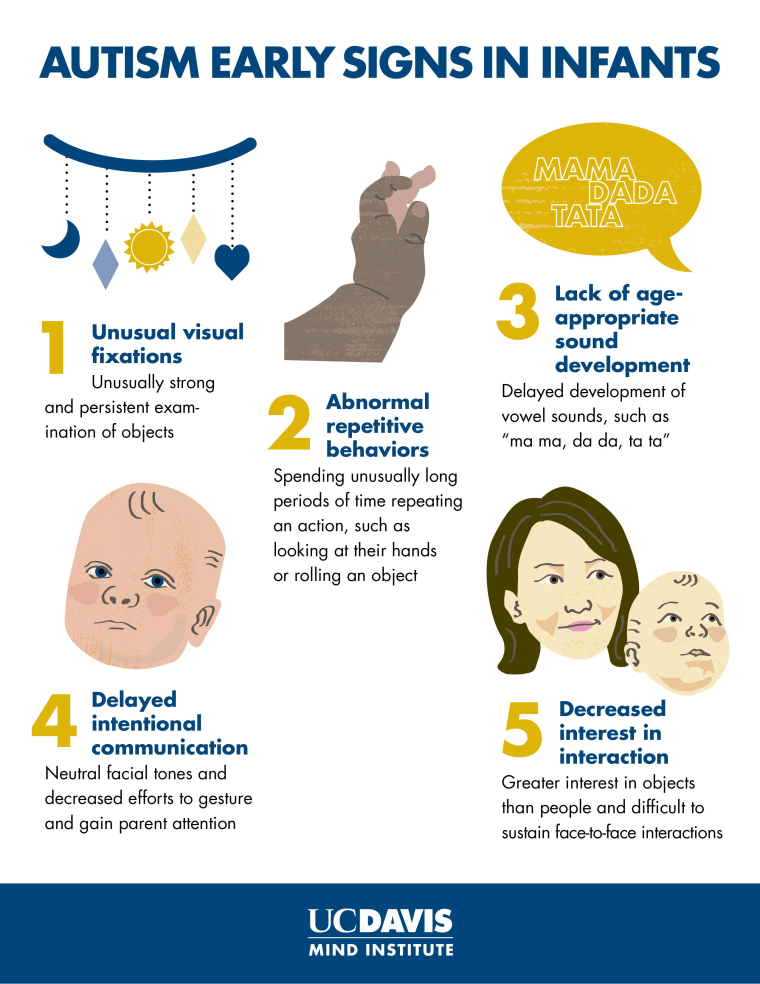Top qualities of an effective Autism Behavioral Therapy method
Top qualities of an effective Autism Behavioral Therapy method
Blog Article
Trick Symptoms And Signs to Identify in People With Behavior Autism
When you experience a person with behavioral autism, acknowledging key indicators and signs and symptoms is crucial. You could observe difficulties in social interactions and communication, as well as a strong demand for regimens. Furthermore, sensory sensitivities can lead to overwhelming experiences. Recognizing these attributes can improve your support and treatments, however there's more to reveal concerning exactly how these behaviors show up in daily circumstances. Let's discover what these indications really resemble.
Challenges in Social Interactions
When you connect with somebody on the autism spectrum, you could discover they have problem with social signs and communication. These challenges can make social communications feel frustrating for them. You may see them staying clear of eye get in touch with or standing too close or also away throughout conversations, which can develop misunderstandings. They may not detect body movement or facial expressions, making it harder for them to assess how others are really feeling.
Additionally, you might locate that they choose regimens and acquainted settings, which can limit their readiness to engage in brand-new social scenarios. They could talk regarding their passions in great detail without observing if you're interested when they do involve. This can lead to one-sided conversations that leave you really feeling disconnected. Comprehending these obstacles can help you approach interactions with empathy and perseverance, fostering a much more comfortable atmosphere for both of you.
Problem With Verbal and Non-Verbal Communication

Non-verbal interaction can be much more difficult. You might see an absence of eye contact or minimal use of motions, which can make interactions really feel uncomfortable. Facial expressions might not constantly line up with the discussion, causing confusion about their sensations. Recognizing these indicators is vital, as it helps you much better assistance and engage with people on the autism spectrum. By recognizing their communication obstacles, you can foster a lot more meaningful connections and give a more helpful environment.
Repeated Actions and Regimens
Communication difficulties usually accompany other indications of autism, such as recurring actions and a solid preference for routines. You may observe that individuals with autism frequently involve in details, repeated actions, like hand-flapping, rocking, or repeating phrases. These habits can supply convenience and a feeling of control in a frequently overwhelming world.
When they adhere to an organized timetable,Regimens are just as important; many individuals thrive. You may find that modifications to these routines can lead to significant distress. For example, if they have a daily routine of consuming morning meal at a certain time or complying with a specific route to school, any kind of disturbance can create anxiousness.
Identifying these patterns assists you understand their actions and supply support. By accommodating their demand for regular and enabling repetitive activities, you can produce a more comfy setting that alleviates their challenges.
Sensory Level Of Sensitivities

Typical Sensory Triggers
Sensory level of sensitivities can substantially affect day-to-day life for people with autism, as particular stimuli typically activate overwhelming reactions. Common sensory triggers include loud noises, intense lights, and solid scents. Comprehending these triggers can assist you manage your environment better.
Behavior Feedbacks Clarified
Recognizing your behavior reactions to sensory sensitivities is important, as they frequently reveal just how you engage with the world. You might notice that particular noises, lights, or structures overwhelm you, bring about stress and anxiety or discomfort. When encountered with these stimuli, you might take out, cover your ears, or also react boldy. These actions aren't just traits; they're your method of managing overstimulation. You might likewise find on your own seeking details sensory experiences, like deep pressure or quiet settings, to help ground on your own. Acknowledging these patterns helps you recognize your needs far better and can direct how you interact them to others. By acknowledging your sensory level of sensitivities, you can work in the direction of creating a setting that feels a lot more manageable and comfortable for you.
Coping Strategies Introduction
Acknowledging your sensory level of sensitivities is just the primary step; currently it's time to explore coping techniques that can aid you take care of those experiences efficiently. Begin by developing a sensory toolkit tailored to your requirements. This might consist of noise-canceling earphones, fidget playthings, or calming scents. Establishing an organized regimen can additionally provide predictability, decreasing stress and anxiety around sensory overload. Take breaks in a peaceful area to collect yourself when you really feel overloaded. Exercising mindfulness strategies such as deep breathing can aid ground you in the minute. In addition, connect your demands with those around you; having supportive pals and family members can make a huge difference. Remember, locating what functions ideal for you might require time, so be open and patient to attempting new techniques.
Limited Rate Of Interests and Focus
While many people create a vast array of interests, those with autism often show restricted interests and an extreme concentrate on details subjects. You may notice that someone with autism can spend hours delving right into their preferred subject, whether it's a certain sort of train, a particular movie, or a clinical idea. This extreme focus isn't just a leisure activity; it can end up being a main part of their identification and social interactions.
You may discover that discussions revolve around these rate of interests, and they may have a hard time to involve in broader topics. By recognizing and recognizing these restricted rate of interests, you can cultivate a supportive environment where they feel valued and recognized, allowing for more significant links and communications.
Psychological Policy Problems
Individuals with autism commonly encounter difficulties in psychological regulation, which can be influenced by their extreme focus on particular interests. You might notice that when a person is deeply involved in a recommended task, they can experience strong emotions, whether excitement or aggravation. This intensity sometimes makes it difficult for them to move equipments or manage their feelings when points do not go as planned.

Variability in Developing Milestones
When it comes to developmental milestones, you'll notice that individuals with autism typically reveal a large variety of irregularity. You may see a kid stand out in language skills however struggle with social interactions.
It's vital to acknowledge that each individual's journey is one-of-a-kind. Observing these patterns can aid you comprehend their staminas and needs much better.
Often Asked Concerns
How Is Autism Detected in Kid and Adults?
To diagnose autism in adults and youngsters, experts assess behavior, interaction abilities, and social communications. If a private meets the standards for autism spectrum problem., they frequently use standard tests, meetings, and monitorings to identify.
Are There Various Kinds Of Autism Range Disorders?
Yes, there are different kinds of autism range disorders, consisting of Asperger's disorder and pervasive developmental disorder-not or else defined. Each kind differs in severity and attributes, so understanding these distinctions can assist you far better support individuals with autism.
What Therapies Work for People With Autism?
When considering reliable therapies for people with autism, you'll discover choices like Applied Habits Evaluation, speech treatment, and job-related treatment. Each strategy can help enhance communication, social skills, and day-to-day functioning tailored to specific needs.
Can Individuals With Autism Lead Independent Lives?
Yes, people with autism can lead independent lives. With the appropriate support, skills training, and sources, you can aid them develop self-sufficiency, handle everyday jobs, and thrive in various atmospheres, cultivating their independence.
Exactly How Can Family Members Assistance Loved Ones With Autism?
You can support your liked ones with autism by producing an organized setting, urging their rate of interests, exercising persistence, promoting interaction, and promoting social skills. Celebrate their achievements, regardless of exactly how little, and develop an encouraging area.
Although several people on the autism range can recognize and make use of language, they frequently deal with considerable difficulties with both verbal and non-verbal communication. Recognizing these signs is important, as it helps you better support and engage with people on the autism click here range. You may observe that individuals with autism frequently engage in certain, repeated actions, like hand-flapping, rocking, or duplicating expressions.Sensory level of sensitivities can substantially affect everyday life for individuals with autism, as certain stimulations commonly activate overwhelming reactions.When it comes to developing turning points, you'll discover that individuals with autism often reveal a large variety of variability.
Report this page